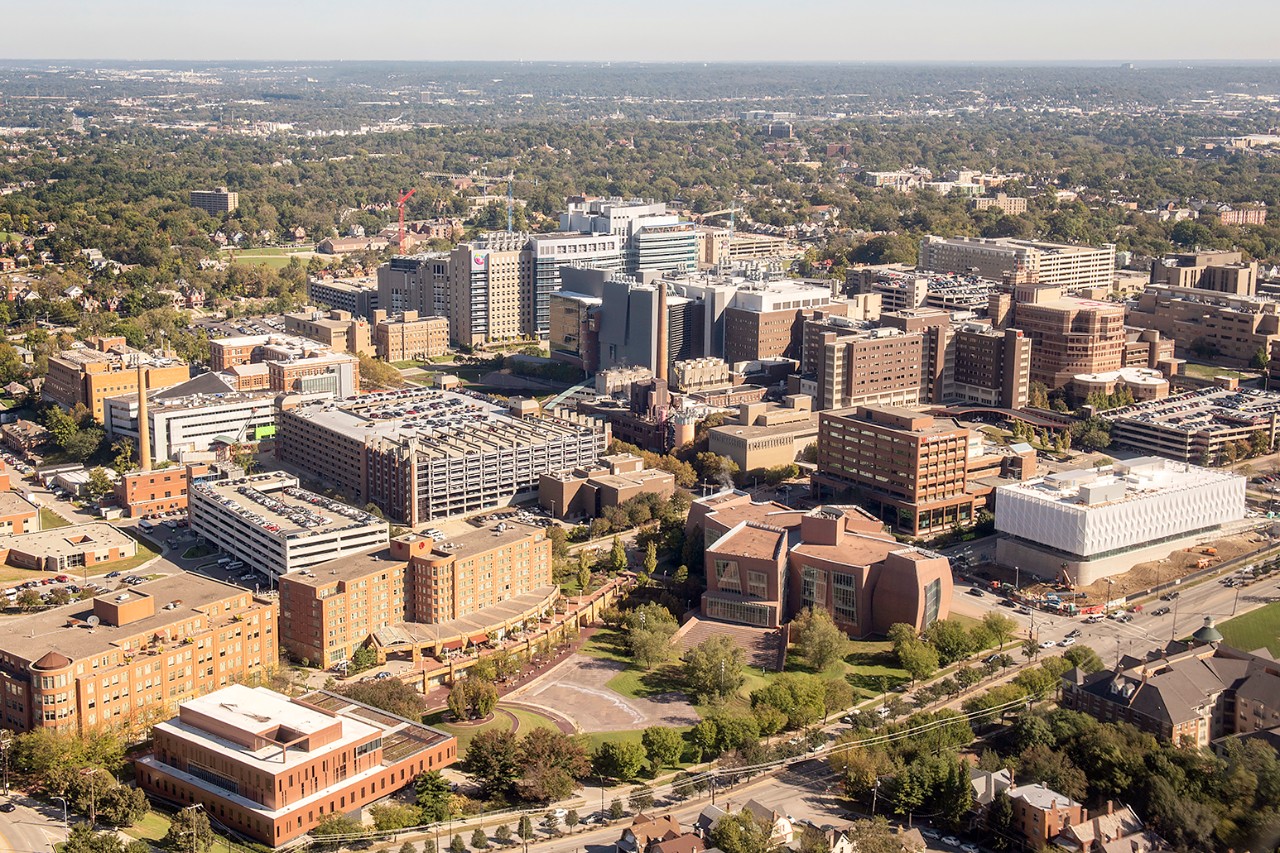
UC Cancer Center forms
Two existing cancer entities form UC Cancer Center, with focus on NCI designation
In a step to further streamline the ongoing cancer efforts at UC, what was formerly known as the Cincinnati Cancer Center (CCC), made up of the University of Cincinnati, UC Health and Cincinnati Children’s Hospital Medical Center, will now be known as the University of Cincinnati Cancer Center.
This operational combination of the CCC and the University of Cincinnati Cancer Institute, which includes all adult cancer patient care activities, will help improve coordination of cancer research activities, community outreach and clinical care at UC and UC Health.
“More than a name change, the unification of our efforts under a cancer organization that is on par with the leading centers in the country reflects the unified tripartite mission of cancer research, education and training and clinical care, eliminates overlap and maximizes collective efforts,” says UC President Neville Pinto.
Dr. William Barrett, Charles M. Barrett, MD, Endowed Chair in Radiation Oncology and professor and chair of radiation oncology, and Dr. Syed Ahmad, professor in the Department of Surgery and chief of the Section of Surgical Oncology as well as director of the UC Pancreatic Disease Center, will serve as co-directors of the UC Cancer Center.
Barrett will lead adult oncology clinical patient activities at UC Health; Ahmad will oversee research and academic components as well as lead the university’s efforts toward National Cancer Institute (NCI) designation.

Dr. Syed Ahmad and Dr. William Barrett, co-directors of the UC Cancer Center. Photo credit: Colleen Kelley/UC Creative + Brand
“NCI designation is awarded to academic institutions for their innovativeness and impact of their research in understanding the cause and progression of cancer, ways to diagnose and treat patients with cancer, and prevent and control the arise of cancer in the region, nation and world,” says Interim Senior Vice President for Health Affairs and UC College of Medicine Dean Dr. Andrew Filak Jr. “It is recognition of the collective cancer research excellence of the UC faculty at our three institutions and is something we desire for the benefit of everyone in Cincinnati and the Tristate region. Working together with patients, families and the broader regional health care community, we believe this streamlined UC Cancer Center organization and the coordinated leadership of Drs. Barrett and Ahmad will move us in the right direction and place us in the best position to seek NCI designation when we have met all requirements.”
Barrett has led the Department of Radiation Oncology since its founding in 2008. He has been the director of the UC Cancer Institute since 2014. Ahmad is an active clinician and translational researcher focusing on novel treatment approaches for pancreatic cancer.
Filak noted that the cancer research portfolio is healthy and growing, and UC scientists continue to conduct groundbreaking research. Clinical research also has grown significantly, especially with investigator-initiated clinical trials growing by nearly 50 percent in the last three years.
NCI designation would be a recognition of cancer research excellence of UC faculty from the university, UC Health and Cincinnati Children’s Hospital Medical Center, says President and Chief Executive Officer of UC Health Dr. Richard Lofgren.
“Many of our clinical programs are now recognized on a national level, with patients traveling to Cincinnati from around the country to seek our expertise. This collective excellence has allowed us to recently recruit many talented researchers and clinicians, and we expect this trend to continue,” Lofgren says.
Leaders also emphasized that Cincinnati Children’s remains a very strong and close partner in these efforts.
“Cincinnati Children’s will remain a vital partner in the cancer effort,” says President and Chief Executive Officer of Cincinnati Children’s Hospital Medical Center Michael Fisher. “Pediatric cancer clinicians and researchers at Cincinnati Children’s hold primary and joint academic appointments in the University of Cincinnati College of Medicine. A hallmark of our cancer programs is the high degree of collaboration between researchers and clinicians who focus on pediatric cancer with colleagues whose focus is adult cancer. United through the new UC Cancer Center organization, these University of Cincinnati faculty will focus on solving the problems related to both pediatric and adult cancer, as well as the issues facing survivors after a cancer experience.
“Cancer clinicians and researchers at Cincinnati Children’s—as UC faculty—will be important members and thought leaders within the UC Cancer Center, working closely with Dr. Ahmad and the administrative team of the UC Cancer Center on matters and initiatives of importance to NCI designation efforts.”
Pediatric oncology, hematology and bone marrow transplant patient care and research remains under the auspices of the internationally pre-eminent Cincinnati Children’s Cancer and Blood Diseases Institute and its leadership and institutional reporting structures.
Related Stories
UC researcher launches app to connect patients to lifesaving...
May 7, 2025
A cardiologist and researcher at UC’s College of Medicine joined the Venture Lab at the 1819 Innovation Hub to launch High Enroll, an app that links clinical trials with willing participants.
Growing heart failure epidemic calls for prioritizing primary...
May 5, 2025
A rapidly growing heart failure epidemic calls for prioritizing primary prevention, according to a new scientific statement from the American Heart Association published in Circulation in April. The statement reviews the current evidence for predicting heart failure risk and offers risk-based strategies for heart failure prevention.
Machine learning brings new insights to cell’s role in...
April 30, 2025
Researchers led by the University of Cincinnati’s Anna Kruyer and the University of Houston’s Demetrio Labate have published research in the journal Science Advances applying object recognition technology to track changes in brain cell structure and provide new insights into how the brain responds to heroin use, withdrawal and relapse.
